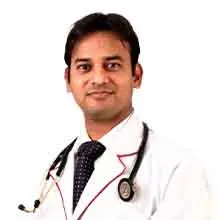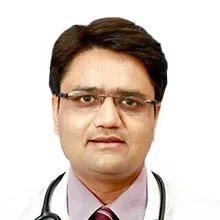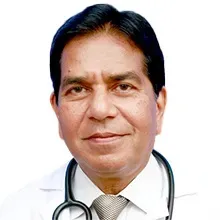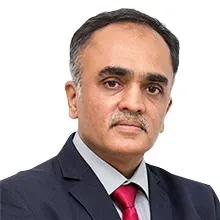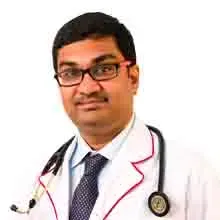About Doctor DR. IMRAN SHAIKH
About
Dr. Imran Nisar Shaikh is a Medical oncologist and has over ten years of expertise. His areas of expertise include the delivery of targeted therapies, intrathecal chemotherapy, lumbar puncture,
bone marrow aspiration and biopsies, vascular catheter insertion, medical oncology, immuno-oncology, hemato-oncology, and the treatment of solid tumors. He has worked on both domestic and foreign borders, and he frequently accepts invitations to participate as a guest speaker at scientific gatherings, CMEs, and international conferences regarding various cancer types. Inlaks-Budhrani Hospital, Saifee Hospital, Jaslok Hospital, and Sushrut Hospital are just a few of the prestigious Indian institutions with whom he has worked. Dr. Shaikh received his undergraduate and graduate degrees from the esteemed BJ Medical College in Pune, and he then completed his DNB in medical oncology at the renowned Jaslok Hospital and Research Centre in Mumbai. He holds a lifetime membership in Icon and is also a member of the European Society of Medical Oncology.
Work Experience
10 years of experience
Dr. Imran Shaikh completed his specialization in Medical Oncology and Hemato-Oncology at Jaslok Hospital and Research Centre, where he worked on evidence-based medicine and the use of cutting-edge medical oncology treatment modalities (including targeted therapies and immunotherapies in addition to chemotherapy). He also gained invaluable practical experience in the management of all types of cancer (solid tumors and blood cancers). Since he has a strong interest in clinical research, he has participated in several clinical studies at the institution. Before working at Kokilaben Dhirubhai Ambani Hospital, he also gained experience at a number of prestigious institutions, including Jaslok Hospital, Saifee Hospital, Sushrut Hospital, and Inlaks and Budhrani Hospital.
Associated with Hospitals
Kokilaben Dhirubhai Ambani Hospital, Mumbai
List of Treatments
Dr. Imran Shaikh is offering the following treatment procedures:
-
Tumors and Cysts: A cyst is a sac that can contain air, liquids, or other substances. Any portion of the body, including bones, organs, and soft tissues, can develop a cyst. Most cysts are noncancerous. Tumors are defined as any unwanted mass of cells or inflammation in the body. As compared to cysts, tumors are cancerous. Surgeries are often performed to treat tumors and cysts.
-
Brachytherapy (Internal Radiation Therapy): Brachytherapy is an internal radiation treatment that employs radiation to kill cancer cells and decrease tumors. Radiation is frequently delivered in the form of seeds, ribbons, or wires. These are injected into your body, either in or around the malignancy.
-
Chemotherapy of Hematological Malignancies: Cancers that affect the blood, bone marrow, and lymph nodes are known as hematologic malignancies. Chemotherapy is performed to treat these types of malignancies by using chemical drugs to destroy the tumor cells and prevent further tumor growth.
-
Adrenal Cancer Treatment: One or both of the tiny, triangular glands (adrenal glands) that are situated on top of your kidneys might develop adrenal carcinoma, a rare kind of cancer. Malignancy that has progressed to tissues close to the adrenal cortex is then surgically removed.
-
Bladder Cancer Treatment: When a tumor, a development of abnormal tissue, forms in the bladder lining, the condition is referred to as bladder cancer. The main course of treatment for bladder cancer is surgery. The location of the malignancy determines the type of operation.
-
Radiotherapy: High doses of radiation are used in radiation therapy, commonly known as radiotherapy, as a cancer treatment to eradicate cancer cells and reduce tumor size. As with x-rays of the teeth or shattered bones, radiation is utilized at low levels in x-rays to view inside the patient’s body.
-
Chronic Lymphocytic Leukemia (CLL): In the case of chronic lymphocytic leukemia, an excessive number of lymphocytes are produced by the bone marrow. Leukemia can have an effect on red blood cells, white blood cells, and platelets. Fatigue and enlarged lymph nodes are two indicators of chronic lymphocytic leukemia.
-
Chemotherapy for Solid Malignancies: Chemotherapy for solid malignancies is a treatment that uses drugs to destroy cancer cells. It is referred to as a systemic therapy because the medicines go through the bloodstream. As the chemicals affect the entire body, they can destroy cancer cells in the tumor as well as any cells that have broken out of it and traveled through the blood or lymph to another place.
-
IMRT: Conformal radiotherapy includes intensity-modulated radiation (IMRT). With conformal radiotherapy, the radiation beams are precisely shaped to fit the cancerous tissue. A linear accelerator (LINAC), a common radiation device, can be used for IMRT.
-
Melanoma Treatment: Disorders of the tumor cells are also known as melanoma. The primary therapy for melanoma is surgical removal of the original melanoma on the skin, known as excision. Most melanomas are discovered when they are less than 1.0 mm thick, and minimally invasive treatment is frequently all that is required.
-
Giant Cell Tumor Treatment: Curettage is the most commonly utilized surgical treatment to treat giant cell tumors. Special devices are used to remove the tumor from the bone during curettage, after which a bone transplant is performed. The opening is filled with a bone transplant after curettage to strengthen the bone.
Oral Cancer Treatment: Oral cancers can form on the tongue, the tissue that covers the mouth and lips, beneath the tongue, at the base of the tongue, and in the neck area towards the back of the mouth. Treatment for oral cancer includes a combination of surgery, radiotherapy, or chemotherapy.
Publications
-
Mortui vivos docent – the dead teach the living: 18-flurodeoxyglocose positron emission tomography-computed tomography findings in a case of intravascular B cell lymphoma Prathamesh V. Joshi, Vikram R. Lele, and Imran Shaikh, Journal of Cancer Therapeutics, January–March 2013, volume 9, issue 1.
-
Paradigm shift from palliation to cure in metastatic microsatellite-high colorectal carcinoma with immune checkpoint inhibitors. Anjum Mehmood Dhamani, Hardik Sanjeev Sheth,Susrita Bhattacharyya, and Imran Nisar Shaikh, Journal of Cancer Research and Therapeutics, Year : 2021, Volume: 17, Issue: 6, Page: 1552-1555
-
Germline BRCA mutation studies in a select Indian cohort using Next Generation Sequencing (NGS)
-
Jaya Vyas, Madhavi Pusalkar, Rajavarman Kittu, Sewanti Limaye, Amanda Gomes, Ritika Tiberwala, Sneha Khairnar, Suchi Vora, Namrata Londhe, Meenal Hastak, Bijal Kulkarni, Nevitha Athikari, Sandeep Goyle, Mandar Nadkarni, Yogesh Kulkarni, Archana Shetty , Imran Nisar Shaikh, Puja Dewan and Varsha Vadera
-
AMP 018 Annual Meeting and Expo Poster Presentation and publication in The Journal of Molecular Diagnostics
Education and Training
-
MBBS and MD (Internal Medicine): BJ Medical College, Pune
-
DNB (Medical Oncology): Jaslok Hospital and Research Center
Trainings/Specializations
Membership
Special Interest
 Associated with hospitals
Associated with hospitals
Envisioning the goals & paving the path to success for the organization.
Book Appoinment
Similar Doctors In Mumbai Central
Envisioning the goals & paving the path to success for the organization.










